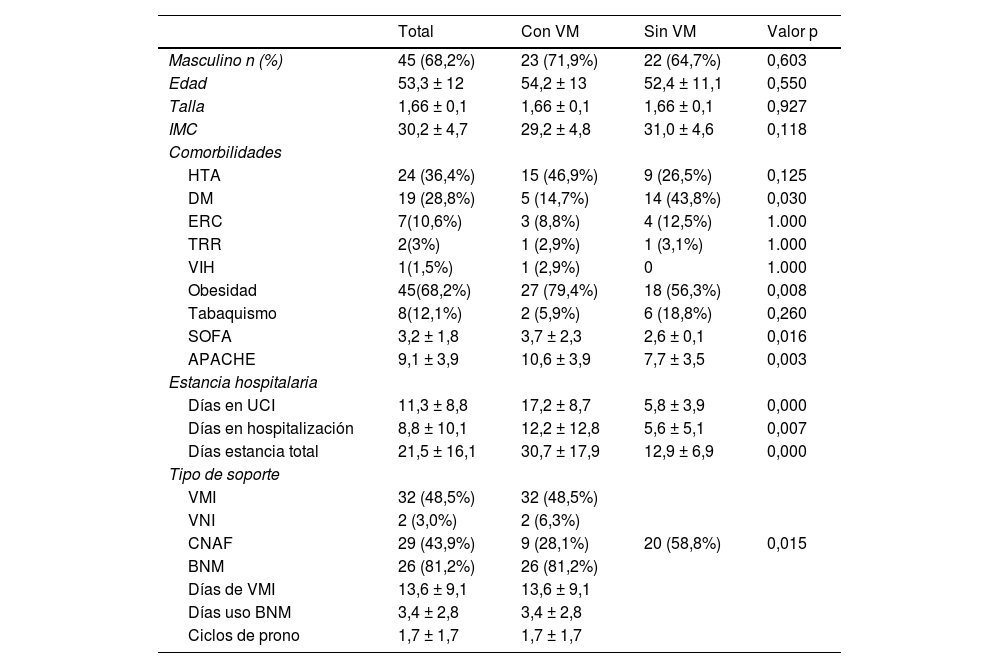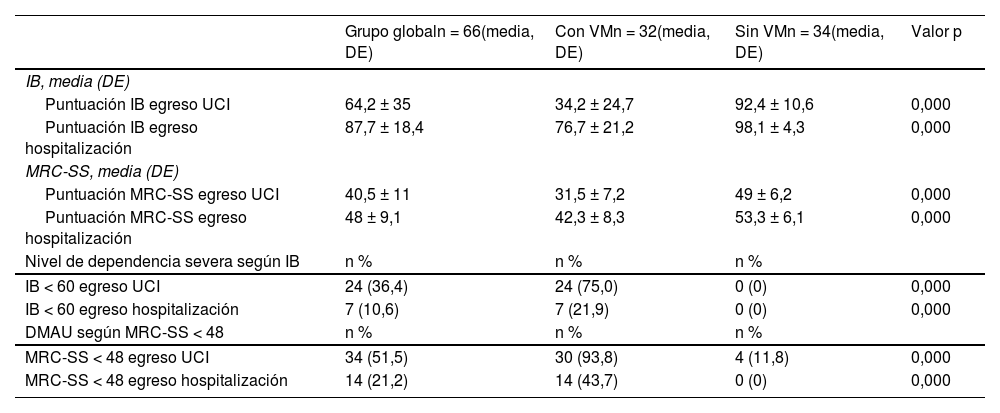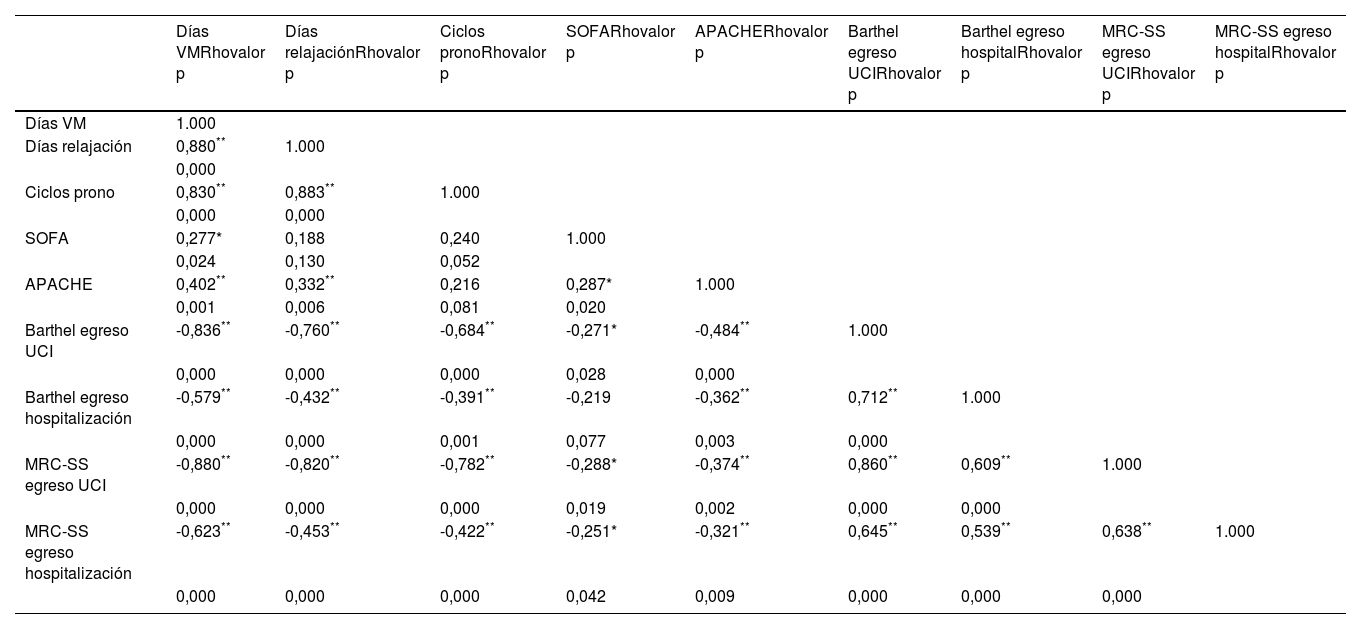El paciente crítico hospitalizado en cuidado intensivo (UCI) tiene más riesgo de deterioro en la función física. Una forma de contrarrestarlo está relacionada con la intervención temprana de fisioterapia, pero son escasos los reportes en pacientes con enfermedad severa por COVID-19.
ObjetivoDescribir el compromiso y cambio en la funcionalidad y en la fuerza muscular en pacientes con COVID-19 que recibieron intervención temprana de fisioterapia en UCI hasta el alta hospitalaria, y comparar la evolución de acuerdo con si recibieron ventilación mecánica invasiva o no.
MetodologíaEstudio retrospectivo de pacientes con COVID-19 que ingresaron a UCI entre marzo y septiembre del 2020 y recibieron intervención de fisioterapia. La funcionalidad se evaluó con el índice Barthel (IB) y la fuerza muscular con el Medical Research Council Sum Score (MRC-SS), los cuales fueron medidos por el fisioterapeuta de turno en dos momentos, al egreso de UCI y de hospitalización. Se consideró el valor p < 0,05 como significativo.
ResultadosSe revisaron 66 registros; la edad promedio fue de 53,3 (32 ± 11,5) años; 32 (48,5%) requirieron ventilación mecánica. Se observó compromiso en la funcionalidad y en la fuerza muscular, con mejoría progresiva antes del egreso hospitalario: IB [64,1 (± 34,7) vs. 87,7 (± 18,4) p = 0,000], MRC-SS [40,5 (± 11) vs. 48 (± 9) p = 0,000]. El grupo de pacientes ventilados presentó mayor compromiso IB [34,2 (± 24,7) vs. 76,7 (± 21,2) p = 0,000] y MRC-SS [31,5 (± 7,2) vs. 42,3 (± 8,3) p = 0,000]. Los días de ventilación mecánica, de relajación, y mayor APACHE II mostraron una correlación negativa significativa con las variables de resultado (p = 0,000).
ConclusionesLos pacientes con enfermedad severa por COVID-19 que recibieron intervención de fisioterapia mostraron cambios significativos en la funcionalidad y en la fuerza muscular. Los pacientes que requirieron ventilación mecánica presentaron mayor compromiso funcional.
The critically ill patient hospitalized in intensive care unit (ICU), has a higher risk of deterioration in physical function. One way to counteract its related to early physiotherapy intervention, but there are few reports in patients with severe disease from COVID-19.
ObjectiveTo describe the compromise and change in functionality and muscle strength in patients with COVID-19 who received early physiotherapy intervention in ICU until hospital discharge and compare the evolution according to whether or not they received invasive mechanical ventilation.
MethodologyRetrospective study of patients with COVID-19 admitted to the ICU between March and September 2020 and received physiotherapy intervention. Functionality was assessed with the Barthel Index (BI) and muscle strength with the Medical Research Council Sum Score (MRC-SS), which were measured by the physiotherapist at two moments, upon discharge from ICU and from hospitalization. For the correlations, a value P<.05 was considered significant.
ResultsSixty-six records were reviewed; the mean age was 53.3 (32±11.5) years; 32 (48.5%) required mechanical ventilation. Compromise in functionality and muscle strength was observed, with progressive improvement before hospital discharge: IB [64.1 (± 34.7) vs. 87.7 (± 18.4), P = .000], MRC-SS [40.5 (± 11) vs. 48 (± 9), P = .000]. The group of ventilated patients presented greater compromise: IB [34.2 (± 24.7) vs. 76.7 (± 21.2), P = .000] and MRC-SS [31.5 (± 7.2) vs. 42.3 (± 8.3), P = .000]. The days of mechanical ventilation, relaxation, and higher APACHE II showed a significant negative correlation with the outcome variables (P = .000).
ConclusionsPatients with severe disease from COVID-19 who received physiotherapy intervention, showed significant changes in functionality and muscle strength. The patients who required mechanical ventilation presented greater functional compromise.
Article
Si ya tiene sus datos de acceso, clique aquí.
Si olvidó su clave de acceso puede recuperarla clicando aquí y seleccionando la opción "He olvidado mi contraseña".











